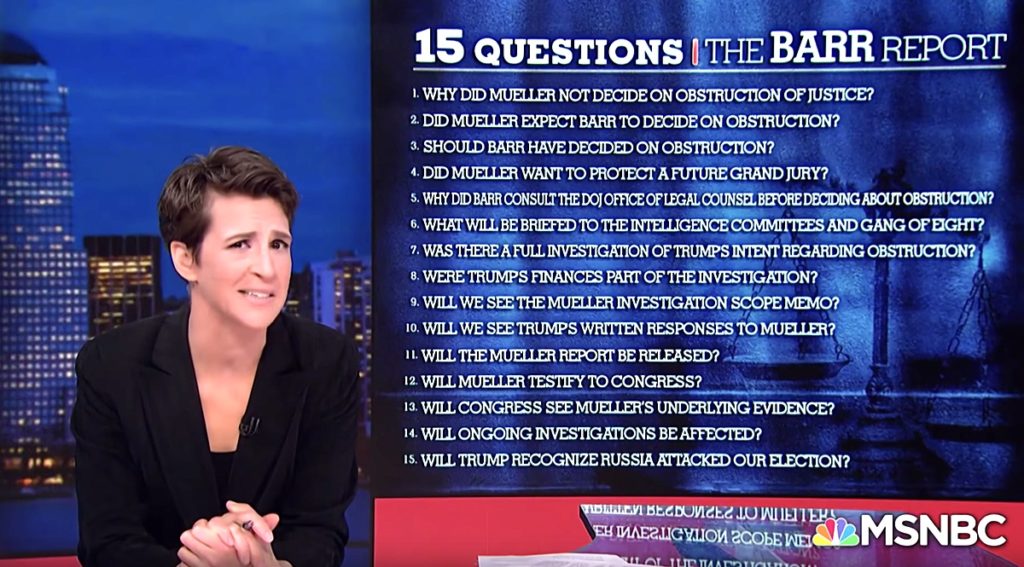
Rachel Maddow on Monday night dug into 15 questions about the Mueller Report, which she rightly calls the Barr Report because it only represents the Attorney General's spin on Mueller's findings.
Maddow noted that Attorney General William Barr “has been on the job for a month” and “got the job after submitting to the White House an unsolicited 19-page memo which claimed that the president inherently can't obstruct justice and Robert Mueller can't even investigate him for that.“
Said Maddow: “We do not have the Mueller report. We have less than 50 words that Barr says are quotes from the Mueller report. Other than that we've just got William Barr's statement, and William Barr's statement––we can call it the ‘Barr report'––it raises all sorts of brand-new questions we didn't have before about what exactly is going on here with this investigation and what fruits it will be allowed to bear.”
Maddow then went through the questions she had about the Barr Report, some of which stick out more than others.
1. Why did Mueller not decide on obstruction of justice?
2. Did Mueller expect Barr to decide on obstruction?
3. Should Barr have decided on obstruction?
4. Did Mueller want to protect a future grand jury?
5. Why did Barr consult the DOJ office of legal counsel before deciding about obstruction?
6. What will be briefed to the Intelligence Committees and Gang of 8?
7. Was there a full investigation of Trump's intent regarding obstruction?
8. Were Trump's finances part of the investigation?
9. Will we see the Mueller investigation scope memo?
10. Will we see Trump's written responses to Mueller?
11. Will the Mueller report be released?
12. Will Mueller testify before Congress?
13. Will Congress see Mueller's underlying evidence?
14. Will ongoing investigations be affected?
15. Will Trump recognize Russia attacked our election?
Maddow picked out the fourth question for greater scrutiny, suggesting that Mueller may not have made a statement about guilt on obstruction was that he was trying to avoid tainting a future grand jury who would indict a sitting president once they were out of office.
Said Maddow: “One of the reasons it might not be proper for a prosecutor, for any prosecutor, or for the DOJ more broadly, to jump in and make a pronouncement that a president appears to have committed crimes is because of the possibility that that president could actually be indicted and prosecuted and put on trial for those crimes after he or she has left office.”
Maddow then brought up a very similar-sounding scenario to the campaign finance violation charges that have been brought against Michael Cohen and Individual 1, posing a hypothetical situation in which they might indict a president when he leaves office.
Added Maddow: “So, say they plan to do that. They plan to try to secure that indictment against the president starting the day he leaves office. That kind of a scenario might be a reason why a prosecutor, and why the Department of Justice, more broadly, would not want to go on the record publicly declaring whether or not some behavior by the president amounts to a crime. Because that sort of pronouncement from a Justice Department prosecutor or the Justice Department more broadly would taint the deliberations of any grand jury that was asked to consider whether an ex-president committed a crime and should be indicted as such.”
Maddow continued: “And if that's why Mueller believed that he was not supposed to say one way or the other whether this was a crime, if that's why he believes this is just the facts, other people should come to their conclusion about whether or not this is a crime, if that's why Mueller was on that point to give any recommendationm to pronounce any conclusion or make any prosecution announcement, if that's why Mueller was holding back on that, did William Barr blow that up when William Barr decided to land on two feet on one side of that question? Did he just screw up any grand jury proceedings that Robert Mueller was trying to protect?”
Maddow went on to dig into more of the questions.
Maddow then spoke with David Laufman, former chief of the Counterintel and Export Control Section of the Department of Justice about the Barr Report and its lack of recommendation on the question of Trump's obstruction of justice.



